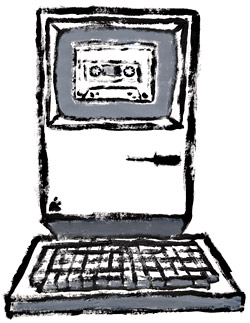Now is a bad time to be a giant music corporation, but ethically challenged music fans couldn’t ask for better days. Bootlegging has always been about catering directly to the fans, and the Internet breeds the best bootleggers yet: bigger and stronger and faster than ever before, the better to handle the demands of 10 million file sharers trading a billion and a half songs daily.
It’s clear now that the CD-R bent the CD over and the MP3 player finished it off, and although the industry is still in shock, smaller and more agile labels are already accepting the inevitable and locking in a vinyl/digital-only production schedule, then using merch like T-shirts—low production cost, high sale price, lots of options to ratchet up collectibility—to plug their revenue gaps.
Since file sharing is permanent enough now that you can buy $19-per-year lawsuit insurance, it’s time to acknowledge the bright side. Out-of-print doesn’t mean anything anymore. If you can learn about it, you can listen to it, and if the record company doesn’t want to reissue it, you can probably find it without even having to stand up. The romance is gone but the music is cheap, accessible, and instant—that’s the music industry of the future, brought to you now by Russian MP3 pirates, obsessive genre bloggers, and criminals selling albums off a blanket on the street. Highlights of a year of unfair shares:
PodTube and iTube: Once YouTube really got going, the video collectors blew open their vaults. This is footage no one ever saw from sources no one ever heard of—psychedelic small-town variety shows, supersaturated Scopitone camp-operas, unfinished punk-rock docs, and student films. Watching them was good enough, but now you can illegally own them through programs that copy those videos to your hard drive. PodTube and iTube get you screening items unseen since the day the station filmed them.
Street Meat: You don’t even need a computer to play this one. If you live in one of the Recording Industry Association of America’s 12 priority piracy cities (which include Dallas, Houston, L.A., Miami, N.Y.C., and San Francisco), you can get bootlegs hot off the sidewalk, out the trunk, or on the bus. “A disturbing trend,” said RIAA executive VP Brad Buckles. “As the pirate music trade continues to evolve, criminals are enhancing their products.” Thanks for the tip, Brad! On the menu now are knockoffs of chart hits bulked up with bonus tracks, chopped and screwed remixes ready right after the legit release hits stores, and the RIAA’s dreaded “dream compilations,”—albums that mix tracks between competing labels into albums that are too good to be legit.
Zune: Microsoft’s Zune—aka “the BetaPod”—seems destined to be a sure staple of the thrift stores of the future. And that’s too bad because wireless file transfer without Microsoft’s copyright hobbles is a seductive idea. Imagine the record conventions of 2016: a bunch of silent geeks pointing blinking black boxes at each other and going home with a billion and a half new songs, and . . . actually, that’s a little pathetic. But the fact remains that instant player-to-player wireless transfer would (and probably eventually will) be the most efficient reiteration of the old going-over-to-your-friend’s-house-with-a-bag-of-blank-tapes ritual. Maybe it will become reality by the time Zune 2.0 rolls out, when Microsoft gets desperate to dig out from under the iPhone.
Sharity Blogs: Much better than the sanctioned sites that give you one brand-new track smothered in a bunch of recycled reviews. Instead, sharity blogs resurrect full albums long lost or forgotten and post them in their entirety on overseas hosting sites. It’d be almost obscenely exploitative except for the obvious love and research put into the selections. This is a scholarly crowd on an admirable mission: rescuing suppressed Japanese terror-folk, Brazilian psych nuggets, and buried Golden Age hip-hop from graves where reissue labels fear to dig.
MySpaceGopher: Everyone with electricity and an instrument has a MySpace Music site, but the songs are still downloadable at the artist’s discretion. Inevitably, hackers removed that discretion, and while it’s disrespectful, it was an effective way to ransack exclusive prerelease streaming content. MySpace repeatedly repairs the code holes that allow these shenanigans, and the public responds by finding a new hole. At press time, the newly disabled MySpaceGopher was working on a fix, which will probably be ready by the time you read this.
Snob Torrents: Concentrated swapper sites are gonna strangle themselves with stinginess, the same way networks like Hotline and KDX sank into obscuro- lescence. Music freeboters don’t like to follow rules about ratios—there’s no homework among thieves—so sites like these will probably vanish as users move to free sharity blogs, friendlier message boards, and unstumpable file-share networks.
Premix Leaks: Lupe Fiasco may hate these—an unmixed version of his Food & Liquor came out months early—but premix leaks are becoming routine. TV on the Radio’s Cookie Mountain also came out months prematurely, the Shins’ Wincing the Night Away (due in January) has leaked at least twice in different versions, and Bloc Party’s A Weekend in the City (due in February) hit the networks in November. The solution now belongs to the PR people—lucky Lupe got an early review calling him the future of hip-hop, and a correctly leveraged premix can garner a spike of welcome, unexpected publicity.
Virtual Release: If legendary 78 collector Joe Bussard could plug an iBook directly into his Victrola, he’d be making these. This is real ghostly stuff: sourced from unreleased sessions or radio broadcasts or repo’d master tapes. That’s all time-honored bootleg chow, sure, but virtual releases go straight from the source to the file shares, skipping physical media entirely. For instance: WFMU recently popularized a Faust album that never made it past a few Virgin Records promo tapes until someone copied it up to MP3. Companion to this are homemade virtual compilations, issued direct from the collector’s originals—a stack of uncomped funk 45s, say—to the file shares with some kind of searchbait name, like “MY HOT FUNK 45s.” These albums are aimed at audiences so microscopic there’s almost no profit in pressing up hard copies—and as such, they’re usually pretty great.
Give It Away Now: Nobody can steal what you give away. A California band called Wooden Shjips put out their EP for free this year; all you had to do was ask and there was a real record in your actual hands. And it was really good, too—blown-out Les Rallizes homage with vocals Echoplexed to infinity. In fact, it was so good that I bought a copy with my own actual money, just for old times’ sake.





